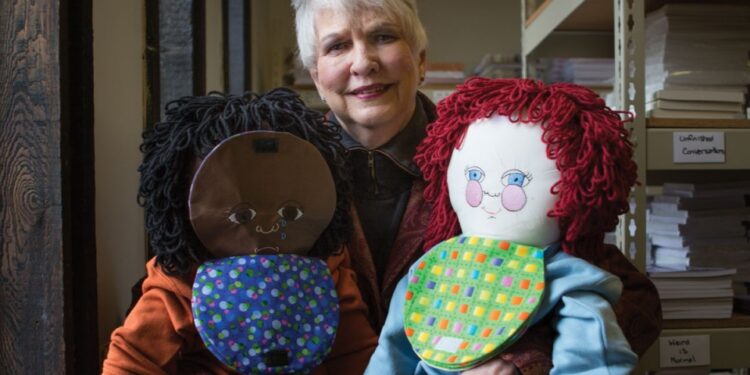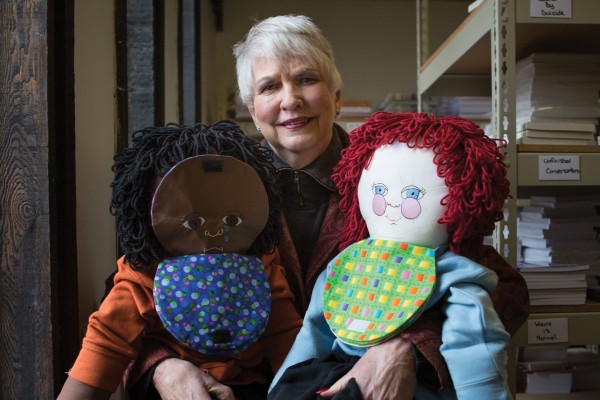r
It wasn’t a funeral. Or a viewing. Or even a celebration of life.
When Joy Johnson’s husband Marvin passed away earlier this year, she held a roast. “We had what Marv would have called one hell of a party,” Johnson says.
Johnson, who co-founded with her late husband the Centering Corporation, a nonprofit grief resource center, has spent the last three decades trying to change the language of death, or at least improve the way we communicate about it: you know, that fate we cannot escape, when we bite the dust or cash in our chips so we can be called home to sleep with the fishes…?
“We don’t have a language of grief yet,” Johnson says.
Seated around a table eating breakfast with a few old friends—hospice nurses and chaplains who have also spent years around death and dying—Johnson continues. The root of the word, ‘widow,’ she says in citing just one example, is ‘destitute.’
“That’s not a good word,” Johnson says.
She and her husband worked with counselors, crisis centers, hospitals, and funerals at Centering Corporation to provide books on death and other grieving resources meant to help people find comfort in the right words. Along with their daughter and former son-in-law, the couple also founded Ted E. Bear Hollow, a nonprofit focused on working through grief with children, who may need different kinds of consoling words. Johnson has also written several books on the subject. But when her husband passed after a battle with esophageal cancer, Johnson found herself on the other side, and those accumulated coping skills were tested. “I like to say I’ve had 37 years of research and writing,” she says, “and now I’m in my practicum.”
Johnson knew there were places to turn and people she could talk to, and she knew what she needed: to get out and do things. So she wrote up a list, which she named ‘Someone to Watch Over Me’—30 names of people she could call to go out with, or meet for breakfast.
“Every grief has its own note,” Johnson says, and dealing with each type is different for everyone.
Long-time friend and retired hospice worker Marcia Blum says a sudden death can be much harder to handle than a prolonged illness. “There’s no anticipatory grief period,” she says. Blum says her parents died within five months of each other; her mother after a long battle with Parkinson’s, and her father shortly after, suddenly. “They were two totally different griefs,” she says. “It was the wrong death in my mind.”
But even in hospice, where one might imagine family members would be prepared for the inevitable, Blum says people are so often surprised by death. It occurs behind closed doors—in hospitals and hospice; it’s not discussed openly. “Nobody sees it,” Blum says. “I think people still avoid real death. There’s the gruesome death that we see on television, but real death is different.”
Words didn’t work for Johnson’s daughter when she faced a sudden and up-close death. Janet Roberts, the executive director of Centering Corporation and the daughter behind the founding of Ted E. Bear Hollow, grew up around the family business and started helping out when she was eight. “I was always comfortable with grief as part of the life cycle,” she says, leading a brief tour of the center’s offices—small and unassuming; shelves of books, boxes and packaging tape stacked behind a circle of couches where visitors can warm themselves with hot coffee and tea. But at 18 years old, Roberts’ boyfriend was killed while she was with him, and the shock threw her into a depression and PTSD. She recalls her mother offered books to help work through her grief, but they were geared to adults, and she couldn’t relate. She left the business for a while, and when she returned decided to start Ted E. Bear Hollow to help teens and children dealing with grief. Teens respond differently, she says; they often they need to write through their grief, or just acknowledge they’ve had a loss.
When Roberts went through that loss, there were few books or resources available for teens, she says. But today, she explains in gesturing to the piled-high shelves, there are thousands.
Back at the breakfast table, Johnson and her friends said attitudes about death have changed significantly in the last couple decades. Communally tragic events like the bombing of the twin towers on 9/11 have made grief and death more public, and people are able to connect through social media as they mourn. But our words are still lacking and our condolences can seem trite—particularly to a group of people who deal with death and its aftermath on a daily basis. I’m sorry for your loss—that’s one Johnson grew tired of hearing. I know how you feel—that’s another. “Don’t assume you understand,” says Blum.
Johnson has her own words for her grief, like DTT, or Designated Tear Time. She’s not a public crier, she says, so she gives herself time alone to let it out.
And aside from ‘hello’ when Johnson goes through her list and makes the call, the words of condolence that she’d like to hear?
r“What a bummer.”














